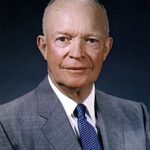President Dwight D. Eisenhower announced his landmark doctrine to Congress on January 5, 1957. This policy emerged after the Suez Crisis exposed Western vulnerabilities in the Middle East. The Eisenhower Doctrine pledged American economic aid and military support to Middle Eastern nations. 📊 Congress approved $200 million in initial funding for the program in March 1957.
Strategic Cold War Response
The doctrine directly countered Soviet attempts to gain influence in oil-rich regions. Eisenhower recognized that communist expansion threatened vital American interests. The policy filled the power vacuum left by declining British and French influence. It established America as the primary Western power in Middle Eastern affairs.
Implementation and Early Success
The doctrine’s first major test came during the 1958 Lebanon Crisis. Eisenhower deployed 14,000 troops to support Lebanon’s government against pro-communist forces. ⚠️ This rapid response demonstrated American commitment to regional allies. The successful intervention validated the doctrine’s effectiveness in containing Soviet influence.
Impact:
The Eisenhower Doctrine fundamentally reshaped Middle Eastern geopolitics for decades. It established enduring American military presence in the region. The policy successfully prevented Soviet domination of strategic oil resources. 🌍 Multiple nations including Lebanon, Jordan, and Iran benefited from American protection and aid.
Long-term Regional Stability
The doctrine contributed to relative stability during the late 1950s and early 1960s. Pro-Western governments received crucial support against communist-backed insurgencies. Economic aid programs strengthened allied nations’ infrastructure and military capabilities. The policy framework influenced subsequent American interventions throughout the Cold War era.
Cold War Strategic Victory
Historians widely praise the doctrine as a successful containment strategy. 🔥 It prevented major communist victories in strategically vital regions. The policy demonstrated American resolve without triggering direct superpower confrontation. Soviet influence in the Middle East remained limited throughout Eisenhower’s presidency. 💰 Oil supplies to Western nations remained secure, supporting economic growth. The doctrine established precedents for American global leadership that extended far beyond the 1950s.
